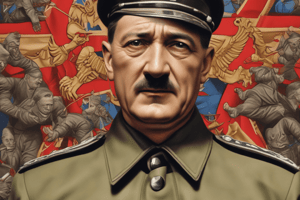Podcast
Questions and Answers
What issue caused German citizens to be willing to accept new leadership? (Select all that apply)
What issue caused German citizens to be willing to accept new leadership? (Select all that apply)
- The loss of government protection
- The loss of territory after the war
- The lack of job availability (correct)
- The lack of a strong ruler
When Hitler assumed control of the Nazi party, what did he immediately begin enforcing?
When Hitler assumed control of the Nazi party, what did he immediately begin enforcing?
his personal nationalistic and racist views
Based upon an understanding of Nazi Germany and Hitler's tactics, what is most likely to happen under totalitarian rule? (Select all that apply)
Based upon an understanding of Nazi Germany and Hitler's tactics, what is most likely to happen under totalitarian rule? (Select all that apply)
- Organizations of young people develop
- Unemployment remains stable
- The government passes new laws
- People lose their civil rights (correct)
Why did Hitler most likely believe Germany had a right to invade other countries? (Select all that apply)
Why did Hitler most likely believe Germany had a right to invade other countries? (Select all that apply)
Why were idealistic supporters of the Nazi party willing to endorse Hitler's annexation of Austria? (Select all that apply)
Why were idealistic supporters of the Nazi party willing to endorse Hitler's annexation of Austria? (Select all that apply)
What did the Third Reich base its power primarily on?
What did the Third Reich base its power primarily on?
How can Hitler be described as a fanatical despot?
How can Hitler be described as a fanatical despot?
Why was appeasement a popular policy among European leaders? (Select all that apply)
Why was appeasement a popular policy among European leaders? (Select all that apply)
What was one aspect of Racial Purity laws? (Select all that apply)
What was one aspect of Racial Purity laws? (Select all that apply)
Why did the Nazi party most strongly appeal to the German people? (Select all that apply)
Why did the Nazi party most strongly appeal to the German people? (Select all that apply)
Flashcards are hidden until you start studying
Study Notes
Economic and Political Context
- German citizens faced significant job shortages, contributing to a desire for new leadership.
- The aftermath of World War I saw Germany losing territory and government protection, breeding dissatisfaction.
Hitler's Leadership and Ideology
- Upon taking control of the Nazi Party, Hitler enforced his nationalistic and racist ideologies.
- He sought to gain political power by undermining the leadership structure, including the communist party.
Totalitarianism Effects
- Totalitarian regimes often strip citizens of civil rights, leading to a controlled societal structure.
- Under Hitler, unemployment was not necessarily stable as the government focused on militarization and propaganda.
Justification for Expansion
- Hitler believed in the concept of nationalism, arguing for the unification of all Germans, which justified territorial expansion.
- The Third Reich aimed to rebuild its power by acquiring land and resources from neighboring countries.
Public Support for Nazi Policies
- Idealistic supporters endorsed the annexation of Austria for a sense of national glory and historical revival.
- The Nazi Party's call for military strength and action appealed to those disillusioned by past defeats.
Mechanisms of Control
- The Third Reich's power relied heavily on instilling fear within the population as a means of control.
- Censorship and oppressive laws were used to maintain the regime’s grip on society.
Hitler's Leadership Style
- Hitler can be characterized as a fanatical despot, prioritizing violence over negotiation in achieving his goals.
- He gained widespread support, particularly among youth, through powerful and passionate speeches.
Policy of Appeasement
- European leaders pursued appeasement strategies to avoid another devastating conflict, despite recognizing Hitler's ambitions.
- This policy was driven by a desire for peace amid economic struggles.
Racial Purity and Discrimination
- Racial purity laws enforced prohibitions, such as banning marriages between Aryans and Jews, reflecting extreme anti-Semitic views.
- Such regulations aimed to segregate and dehumanize Jewish populations, solidifying Nazi ideology.
Nazi Party Appeal
- The Nazi Party gained traction by blaming others for Germany's defeat in WWI and its resulting hardships.
- The party’s origins in the military and development of a strong militia contributed to its ability to rally support.
Studying That Suits You
Use AI to generate personalized quizzes and flashcards to suit your learning preferences.




